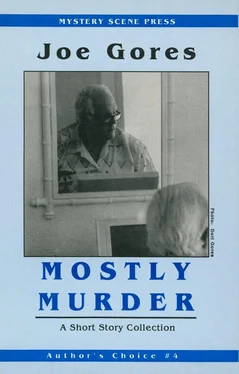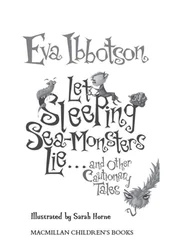I got off the Greyhound and stopped to draw icy Minnesota air into my lungs. A bus had brought me from Springfield, Illinois to Chicago the day before; a second bus had brought me here. I caught my passing reflection in the window of the old-fashioned depot — a tall hard man with a white and savage face, wearing an ill-fitting overcoat. I caught another reflection, too, one that froze my guts: a cop in uniform. Could they already know it was someone else in that burned-out car?
Then the cop turned away, chafing his arms with gloved hands through his blue stormcoat, and I started breathing again. I went quickly over to the cab line. Only two hackies were waiting there; the front one rolled down his window as I came up.
“You know the Miller place north of town?” I asked. He looked me over.
“I know it. Five bucks — now.”
I paid him from the money I’d rolled a drunk for in Chicago, and eased back against the rear seat. As he nursed the cab out ice-rimed Second Street, my fingers gradually relaxed from their rigid chopping position. I deserved to go back inside if I let a clown like this get to me.
“Old man Miller’s pretty sick, I hear.” He half turned to catch me with a corner of an eye. “You got business with him?”
“Yeah. My own.”
That ended that conversation. It bothered me that Pops was sick enough for this clown to know about it; but maybe my brother Rod being vice-president at the bank would explain that. There was a lot of new construction and a freeway west of town with a tricky overpass to the old county road. A mile beyond a new subdivision were the 200 wooded hilly acres I knew so well.
After my break from the Federal pen at Terre Haute, Indiana two days before, I’d gotten outside their cordon through woods like these. I’d gone out in a prison truck, in a pail of swill meant for the prison farm pigs, had headed straight west, across the Illinois line. I’m good in open country, even when I’m in prison condition, so by dawn I was in a hayloft near Paris, Illinois some 20 miles from the pen. You can do what you have to do.
The cabby stopped at the foot of the private road, looking dubious. “Listen, buddy, I know that’s been plowed, but it looks damned icy. If I try it and go into the ditch—”
“I’ll walk from here.”
I waited beside the road until he’d driven away, then let the north wind chase me up the hill and into the leafless hardwoods. The cedars that Pops and I had put in as a windbreak were taller and fuller; rabbit paths were pounded hard into the snow under the barbed-wire tangles of wild raspberry bushes. Under the oaks at the top of the hill was the old-fashioned, two-story house, but I detoured to the kennels first. The snow was deep and undisturbed inside them. No more foxhounds. No cracked com in the bird feeder outside the kitchen window, either. I rang the front doorbell.
My sister-in-law Edwina, Rod’s wife, answered it. She was three years younger than my 35, and she’d started wearing a girdle.
“Good Lord! Chris!” Her mouth tightened. “We didn’t—”
“Ma wrote that the old man was sick.” She’d written, all right. Your father is very ill. Not that you have ever cared if any of us lives or dies... And then Edwina decided that my tone of voice had given her something to get righteous about
“I’m amazed you’d have the nerve to come here, even if they did let you out on parole or something.” So nobody had been around asking yet. “If you plan to drag the family name through the mud again—”
I pushed by her into the hallway. “What’s wrong with the old man?” I called him Pops only inside myself, where no one could hear.
“He’s dying, that’s what’s wrong with him.”
She said it with a sort of baleful pleasure. It hit me, but I just grunted and went by into the living room. Then the old girl called down from the head of the stairs.
“Eddy? What — who is it’”
“Just a salesman, Ma. He can wait until Doctor’s gone.”
Doctor. As if some damned croaker was generic physician himself. When he came downstairs Edwina tried to hustle him out before I could see him, but I caught his arm as he poked it into his overcoat sleeve.
“Like to see you a minute, Doc. About old man Miller.”
He was nearly six feet, a couple of inches shorter than me, but outweighing me forty pounds. He pulled his arm free.
“Now see here, fellow—”
I grabbed his lapels and shook him, just enough to pop a button off his coat and put his glasses awry on his nose. His face got red.
“Old family friend, Doc.” I jerked a thumb at the stairs. “What’s the story?”
It was dumb, dumb as hell, of course, asking him; at any second the cops would figure out that the farmer in the burned-out car wasn’t me after all. I’d dumped enough gasoline before I struck the match so they couldn’t lift prints off anything except the shoe I’d planted: but they’d make him through dental charts as soon as they found out he was missing. When they did they’d come here asking questions, and then the croaker would realize who I was. But I wanted to know whether Pops was as bad off as Edwina said he was, and I’ve never been a patient man.
The croaker straightened his suit coat, striving to regain lost dignity. “He — Judge Miller is very weak, too weak to move. He probably won’t last out the week.” His eyes searched my face for pain, but there’s nothing like a Federal pen to give you control. Disappointed, he said, “His lungs. I got to it much too late, of course. He’s resting easily.”
I jerked the thumb again. “You know your way out.”
Edwina was at the head of the stairs, her face righteous again. It seems to run in the family, even with those who married in. Only Pops and I were short of it.
“Your father is very ill. I forbid you—”
“Save it for Rod; it might work on him.”
In the room I could see the old man’s arm hanging limply over the edge of the bed, with smoke from the cigarette between his fingers running up to the ceiling in a thin unwavering blue line. The upper arm, which once had measured an honest 18 and had swung his small tight fist against the side of my head a score of times, could not even hold a cigarette up in the air. It gave me the same wrench as finding a good foxhound that’s gotten mixed up with a bobcat.
The old girl came out of her chair by the foot of the bed, her face blanched. I put my arms around her. “Hi, Ma,” I said. She was rigid inside my embrace, but I knew she wouldn’t pull away. Not there in Pop’s room.
He had turned his head at my voice. The light glinted from his silky white hair. His eyes, translucent with imminent death, were the pure, pale blue of birch shadows on fresh snow.
“Chris,” he said in a weak voice. “Son of a biscuit, boy... I’m glad to see you.”
“You ought to be, you lazy devil,” I said heartily. I pulled off my suit jacket and hung it over the back of the chair, and tugged off my tie. “Getting so lazy that you let the foxhounds go!”
“That’s enough, Chris.” She tried to put steel into it.
“I’ll just sit here a little, Ma,” I said easily. Pops wouldn’t have long, I knew, and any time I got with him would have to do me. She stood in the doorway, a dark indecisive shape; then she turned and went silently out, probably to phone Rod at the bank.
For the next couple of hours I did most of the talking; Pops just lay there with his eyes shut, like he was asleep. But then he started in, going way back, to the trapline he and I had run when I’d been a kid; to the big white-tail buck that followed him through the woods one rutting season until Pops whacked it on the nose with a tree branch. It was only after his law practice had ripened into a judgeship that we began to draw apart; I guess that in my twenties I was too wild, too much what he’d been himself 30 years before. Only I kept going in that direction.
Читать дальше







![Джон Макдональд - The Hunted [Short Story]](/books/433679/dzhon-makdonald-the-hunted-short-story-thumb.webp)




